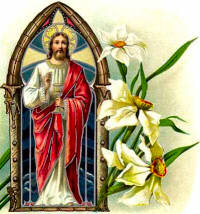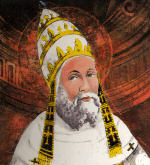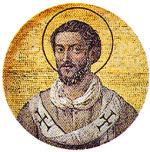
View of the Cappella Maggiore
Piero della Francesca
1452-66
Fresco
San Francesco, Arezzo
Posted on 04/21/2015 9:21:01 PM PDT by Salvation
| John | |||
| English: Douay-Rheims | Latin: Vulgata Clementina | Greek NT: Byzantine/Majority Text (2000) | |
| John 6 |
|||
| 35. | And Jesus said to them: I am the bread of life: he that cometh to me shall not hunger: and he that believeth in me shall never thirst. | Dixit autem eis Jesus : Ego sum panis vitæ : qui venit ad me, non esuriet, et qui credit in me, non sitiet umquam. | ειπεν δε αυτοις ο ιησους εγω ειμι ο αρτος της ζωης ο ερχομενος προς με ου μη πειναση και ο πιστευων εις εμε ου μη διψηση πωποτε |
| 36. | But I said unto you, that you also have seen me, and you believe not. | Sed dixi vobis quia et vidistis me, et non creditis. | αλλ ειπον υμιν οτι και εωρακατε με και ου πιστευετε |
| 37. | All that the Father giveth to me shall come to me; and him that cometh to me, I will not cast out. | Omne quod dat mihi Pater, ad me veniet : et eum qui venit ad me, non ejiciam foras : | παν ο διδωσιν μοι ο πατηρ προς εμε ηξει και τον ερχομενον προς με ου μη εκβαλω εξω |
| 38. | Because I came down from heaven, not to do my own will, but the will of him that sent me. | quia descendi de cælo, non ut faciam voluntatem meam, sed voluntatem ejus qui misit me. | οτι καταβεβηκα εκ του ουρανου ουχ ινα ποιω το θελημα το εμον αλλα το θελημα του πεμψαντος με |
| 39. | Now this is the will of the Father who sent me: that of all that he hath given me, I should lose nothing; but should raise it up again in the last day. | Hæc est autem voluntas ejus qui misit me, Patris : ut omne quod dedit mihi, non perdam ex eo, sed resuscitem illud in novissimo die. | τουτο δε εστιν το θελημα του πεμψαντος με πατρος ινα παν ο δεδωκεν μοι μη απολεσω εξ αυτου αλλα αναστησω αυτο [εν] τη εσχατη ημερα |
| 40. | And this is the will of my Father that sent me: that every one who seeth the Son, and believeth in him, may have life everlasting, and I will raise him up in the last day. | Hæc est autem voluntas Patris mei, qui misit me : ut omnis qui videt Filium et credit in eum, habeat vitam æternam, et ego resuscitabo eum in novissimo die. | τουτο δε εστιν το θελημα του πεμψαντος με ινα πας ο θεωρων τον υιον και πιστευων εις αυτον εχη ζωην αιωνιον και αναστησω αυτον εγω τη εσχατη ημερα |

Feast Day: April 17
Born: at the castle of Exmes, Argentan, near Ayesmes, Normandy, France
Died: 22 April 770, Montreuil, France
Patron of: Diocese of Séez
St. Soter & St. Caius
Feast Day: April 22
Born: St. Soter lived in the second century and St. Caius in the third century
St. Soter was born at Fondi, Latium in Italy and his father was a Greek. He was the twelfth pope and bishop of Rome at the time of the Roman emperors. He was a real father to all Christians and did much to help the poor. He took special care of those who had been punished and sent to work in dangerous mines because they would not give up their faith in Jesus.
These brave Christians were kept hungry all the time and not allowed much rest. Other Christians were chained in prisons. Good Pope Soter did everything he possibly could to comfort and help them.
St. Soter also helped Christians who were far away from Rome. This holy pope was a great preacher. All the Christians loved to listen to him explain the Catholic faith. He spoke with such love. People who listed to him were filled with the courage to die for Jesus rather than worship false gods.
St. Soter himself gave his life for Jesus and died a martyr in the year 174, ten years after he was made pope. At his tomb are written the words "Saint Soter, master of charity, pray for us!"
St. Caius was pope about one hundred years later. He, too, lived in times of great trouble for Christians. This pope did all he could to prepare people to keep the faith at any sacrifice.
To help his people better, he lived eight years in underground rooms, called catacombs. These were cemeteries where the Christians often met in secret to pray and receive the sacraments. This was their hiding place from the cruel pagan soldiers. The Christians knew they would be killed if they were caught.
St. Caius was pope for twelve years. Then he, too, was martyred. He died in the year 296.
Reflection: Let us pray that God may give strength and courage to those who are ill-treated throughout the world because they are Christians.
Wednesday, April 22
Liturgical Color: White
The Church dedicates the month of April to
devotion to the Blessed Sacrament. We are
invited to come before the true presence of
Jesus with our prayers, a practice that dates
back over 1000 years.
|
|
30 The apostles returned to Jesus, and told him all that they had done and taught. 31 And he said to them, "Come away by yourselves to a lonely place, and rest a while." For many were coming and going, and they had no leisure even to eat. 32 And they went away in the boat to a lonely place by themselves. 33 Now many saw them going, and knew them, and they ran there on foot from all the towns, and got there ahead of them. 34 As he landed he saw a great throng, and he had compassion on them, because they were like sheep without a shepherd; and he began to teach them many things. 35 And when it grew late, his disciples came to him and said, "This is a lonely place, and the hour is now late; 36 send them away, to go into the country and villages round about and buy themselves something to eat." 37 But he answered them, "You give them something to eat." And they said to him, "Shall we go and buy two hundred denarii worth of bread, and give it to them to eat?" 38 And he said to them, "How many loaves have you? Go and see." And when they had found out, they said, "Five, and two fish." 39 Then he commanded them all to sit down by companies upon the green grass. 40 So they sat down in groups, by hundreds and by fifties. 41 And taking the five loaves and the two fish he looked up to heaven, and blessed, and broke the loaves, and gave them to the disciples to set before the people; and he divided the two fish among them all. 42 And they all ate and were satisfied. 43 And they took up twelve baskets full of broken pieces and of the fish. 44 And those who ate the loaves were five thousand men.
The miracle of the loaves looks both to the past and to the future.
(1) It recalls miraculous feedings from the OT, like the heavenly manna God provided for Israel in the wilderness (Ex 16) and the multiplied loaves and leftover baskets provided by Elisha (2 Kings 4:42-44).
(2) It also anticipates the later institution of the Eucharist, where the same string of verbs (taking . . . blessed . . . broke . . . gave) is found together, something that occurs only here and at the Last Supper.
Gave them to the disciples: Jesus does not give the multiplied bread directly to the crowds but distributes it to them by the hands of his apostles. This mediation foreshadows their role as New Covenant priests, when they apportion to God's people the heavenly bread that Jesus provides in the Eucharist.
April 22, 2015 by Connie Rossini
St. John Chrysostom wrote, “It is impossible, utterly impossible, for the man who prays eagerly and invokes God ceaselessly ever to sin” (De Anna 4, 5). Since you are reading this post, I assume that you would like to be able to overcome every temptation. But how can we pray constantly, as not only Chrysostom, but also St. Paul taught (cf 1 Thessalonians 5:17)?
St. Teresa of Avila gives us a place to start. Speaking 
about praying vocal prayer well, she pauses a moment to urge her readers to pray throughout the day:
“We must retire within ourselves even during our ordinary occupations. If I can recall the companionship which I have within my soul for as much as a moment, that is of great utility” (Way of Perfection, Chapter 29).
In other words, we should pause often during the day, in the midst of our duties, to spend a moment with God. We don’t have to leave what we are doing. We needn’t take longer than a few seconds. We might begin by choosing a short prayer to say at regular times throughout the day. For example, every time our watch chimes the hour, we might pray silently, “Let it be done to me according to your word.” Or every time we pass a holy picture in our home, we might pray, “Lord, help me to love you with my whole mind, heart, soul, and strength.” Every time we think of food, we could say, “Lord, let me desire you above all earthly pleasures.”
A second way to pray throughout the day would be to imagine serving the Lord in our occupations. A mother dressing her child can imagine she is dressing the Christ Child and do it with special care. A person writing a business plan might imagine himself as an apostle writing the New Testament and write for the glory of God.
Instead of using words, we can use pictures in our minds. Lately I have been picturing the Eucharist in the monstrance several times during the day. I stop what I am doing and gaze at Him, sometimes saying a few words of praise as well. We could also picture the Sacred Heart, the Holy Spirit as a dove, the light of Christ burning in our hearts, or another simple image that can be recalled easily.
Praying throughout the day is not a substitute for a dedicated time of mental prayer. It extends it. It prepares us to be more recollected at mental prayer time. It sanctifies our day and keeps God as our primary focus. And, as St. John Chrysostom noted, it helps us overcome temptation.

Daily Readings for:April 22, 2015
(Readings on USCCB website)
Collect: Be present to your family, O Lord, we pray, and graciously ensure those you have endowed with the grace of faith an eternal share in the Resurrection of your Only Begotten Son. Who lives and reigns with you in the unity of the Holy Spirit, one God, for ever and ever.
RECIPES
ACTIVITIES
PRAYERS
o Regina Coeli (Queen of Heaven)
o Prayers for the Easter Season
o Novena to St. Catherine of Siena
· Easter: April 22nd
· Wednesday of the Third Week of Easter
Old Calendar: Saints Soter and Caius, popes and martyrs
According to the 1962 Missal of St. John XXIII the Extraordinary Form of the Roman Rite, today is the feast of Sts. Soter and Caius. Soter succeeded Anicetus as Pope in 166, and died a martyr in 175, under the emperor Marcus Aurelius. Caius, whose relics are preserved at the sanctuary of St. Silvester in Rome, governed the Church a century later and died on April 22, 296. The popes of the first centuries suffered the heavy anxiety of the persecutions which continually threatened their flocks; the pontificate of Caius, however, was marked by a long period of peace, some ten years before the terrible persecution under Diocletian.
St. Soter St. Soter, the successor to Pope Anicetus, died a martyr's death in 175. He was noted for his kindness to certain Greeks who had been condemned to the mines because of their faith in Christ. When he ascended the chair of Peter he forbade consecrated virgins to touch the sacred vessels and palls, or to carry censers in church. He also obliged the faithful, except those in mortal sin, to receive holy Communion on Maundy Thursday. Soter is the author of a letter to the Corinthians.
St. Soter, the successor to Pope Anicetus, died a martyr's death in 175. He was noted for his kindness to certain Greeks who had been condemned to the mines because of their faith in Christ. When he ascended the chair of Peter he forbade consecrated virgins to touch the sacred vessels and palls, or to carry censers in church. He also obliged the faithful, except those in mortal sin, to receive holy Communion on Maundy Thursday. Soter is the author of a letter to the Corinthians.
St. Caius St. Caius (pope from 283 to 296) was closely related to the Emperor Diocletian. So that he might live to serve the faithful, he remained in concealment a long time and would not leave Rome. Ordinarily it was in the catacombs that he hid, and there he celebrated the holy mysteries and instructed many pagans. It was Pope Caius who decreed (according to the false Decretals) that the following steps must precede consecration to the episcopate: porter, lector, exorcist, acolyte, subdeacon, deacon, and priest. He died a natural death and was buried in the catacomb of Callistus on April 22. St. Susanna was his niece. Pope Urban VIII revived his memory in Rome by restoring his church, naming him as its patron saint, raising it to the rank of a station, and enriching it with the saint's relics.
St. Caius (pope from 283 to 296) was closely related to the Emperor Diocletian. So that he might live to serve the faithful, he remained in concealment a long time and would not leave Rome. Ordinarily it was in the catacombs that he hid, and there he celebrated the holy mysteries and instructed many pagans. It was Pope Caius who decreed (according to the false Decretals) that the following steps must precede consecration to the episcopate: porter, lector, exorcist, acolyte, subdeacon, deacon, and priest. He died a natural death and was buried in the catacomb of Callistus on April 22. St. Susanna was his niece. Pope Urban VIII revived his memory in Rome by restoring his church, naming him as its patron saint, raising it to the rank of a station, and enriching it with the saint's relics.
3rd Week of Easter
Everything that the Father gives me will come to me, and I will not reject anyone who comes to me. (John 6:37)
Did you catch that?
The Father is giving you to Jesus. If you think that statement is meant to be little more than an empty platitude, say it again slowly. Focus on each word, and let them settle deep in your heart. You are a gift that God the Father is giving to Jesus. What does this say about you?
The Father is giving you to Jesus. Well, for one, this says that no matter how your days feel—holy, humdrum, or harried—each one of them is filled with divine opportunities. You’re not just a spectator in life. You are an important actor in a great cosmic drama. What’s more, you have been infused with the life and power of the Trinity, with all you need to play your part in this drama.
The Father is giving you to Jesus. A loving, generous God like your heavenly Father would never dream of giving a cheap gift to his Son! This can only mean that you are very valuable. You’re a masterpiece, a crown of his creation. No cost was too high to pay for you. It also means that God will never revoke your worth. He is completely invested in you. In fact, you are his treasure. He rejoices over you with exuberant, loud singing (Zephaniah 3:17)! It’s not based on how you do each day; it’s based on who you are.
The Father is giving you to Jesus. As a gift to the Lord, your life has been set apart, or made holy. Every day you have a divinely appointed purpose. The Father is giving you to Jesus so that you can give Jesus to the people around you. And you can do that simply by the witness of your life—by living for Christ as the gift that you are.
Today, keep this in mind: you are a special, unique person created by God. There is no one like you. You are a special treasure. You have a divine purpose!
“Lord, I come to you today knowing that you will never reject me. As you gave yourself to me, I give my life to you.”
Acts 8:1-8; Psalm 66:1-7
Daily Marriage Tip for April 22, 2015:
(Especially for parents of teens) You’re seldom right (in your teenager’s eyes). Stay tight with your spouse because you need each other to discern when to be flexible and when to hang tough. Remind each other you’re not crazy.
| “You Will Never Be Lost Where I Cannot Find You.” | ||
|
||
|
April 22, 2015. Wednesday of the Third Week of Easter
|
||
|
|
||
|
|
April 22, 2015
Today’s Feast of the Blessed Virgin Mary, Mother of the Society of Jesus, a feast proper to the liturgical calendar of the Society of Jesus, recognizes the special role of Mary, Mother of God, in the Society of Jesus and is a proclamation of the special devotion of the religious order named after Jesus to his Mother Mary.
Mary played a key role in the conversion of St. Ignatius of Loyola and in the beginnings of the Society of Jesus. After the recovery of Ignatius from his injuries in Pamplona and his “conversion,” he prayed in vigil at the shrine of our Lady of Aranzazu and offered his sword and dagger to Our Lady at the Benedictine monastery in Montserrat.
In his spiritual experiences at the River Cardoner and in the often-used triple colloquy at the end of key exercises in his Spiritual Exercises, the first colloquy was a special prayer for the intercession of Mary, the second to the Son and the third to the Father. The first contemplation of the fourth week of the Spiritual Exercises is on the risen Lord’s apparition to his mother: though not recorded in the Gospels, the risen Lord must have first appeared to his grieving mother.
The first seven companions who eventually were the founding core of the Society of Jesus made their first vows at Montmartre in Paris on the Feast of the Assumption of Our Lady, 15 August 1534. After Pope Paul III approved the Society of Jesus in 1540 the first Jesuits pronounced their religious vows as Jesuits before Mary’s image at the Basilica of St. Paul Outside-the-Walls in Rome. The first church in Rome given to the Society was that of Our Lady of the Wayside, Madonna della Strada.
Jesuits make their perpetual religious vows at the end of novitiate to the Divine Majesty “before the most sacred Virgin Mary and the whole court of heaven.” At the end of their training, Jesuits make their final vows in the Society of Jesus “in the sight of the Virgin Mary and the whole heavenly court.”
We join the Society of Jesus in its love for and confidence in Mary, Mother of the Society of Jesus: “Almighty and eternal God, you chose the Virgin Mary to be the Mother of your eternal Word. Give us strength to be servants of that Word in the Society of Jesus, which is consecrated to your glory in the presence of Mary, our Mother.”
Language: English | Español
All Issues > Volume 31, Issue 3
|
||||||||||||||||||||||||||||||||||||||||

Save the Children!
Support the couples who are expecting a child!
Disclaimer: Opinions posted on Free Republic are those of the individual posters and do not necessarily represent the opinion of Free Republic or its management. All materials posted herein are protected by copyright law and the exemption for fair use of copyrighted works.